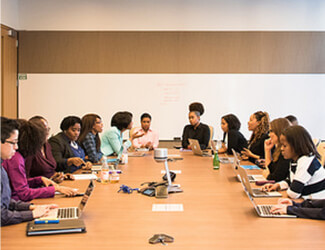Mr. Wheatley makes rounds to the California County Board of Supervisors to discuss the imperative of comprehensive Social and Emotional Learning Supports in schools. Post COVID-19 mission-critical is to ensure children and families also gain access to Primary Care Physicians operating from school sites. The shift to a patient and family-centered system of care will transform K-12 education into a student-centered learning and wellness culture. Community leadership contributing throughout the transformation will legitimize the institution of culturally proficient systems to reduce health, education, and income disparities.
Bruce Wheatley
A spiritual journey that began in 1999, Mr. Wheatley witness K-12 students diagnosed with mental disorders who otherwise had behavioral issues, overtime became his pursuit for Social Justice. Mr. Wheatley intuitively understood his education would gain matriculation along an educational pathway yet defined to avoid life circumstances that detoured previous change leaders. Born in Los Angeles, California, Bruce came of age in a multi-cultural San Gabriel Valley neighborhood. His global travel and work ethic as a professional athlete solidified his appreciation for culture and drive to diminish the institutional stigma’s affecting Black Americans’ health and educational productivity.
Preceding two-decades and 40,000 research hours, Mr. Wheatley’s evidence-backed Continuum of Healthcare and Education System (CHES) aim to disrupt trauma-exposure and unemployment trends overwhelming vulnerable Americans. CHES organizes community stakeholders and service providers within a continuum of systems framework engineered to allow coordinated discussions that aim to improve the delivery of services and administrative functioning to result in a student-centered system of supports. Wheatley Institute’s, Project TIP simultaneously delivers jobs, and trauma-informed learning supports to children, youth, and young adults aspiring health and human service careers. The innovative approach to community-engagement binds community-defined practices with current health and education policy to transform public health and safety establishing a Behavioral Healthcare component within the current PreK-12 education infrastructure.
Mr. Wheatley’s personal and in-depth understanding of the organizational structure, culture, program-services, and categorical funding streams sustaining health, mental health, public health, elementary and secondary education systems has established him a 21st-century Thought Leader. Mr. Wheatley from 2001 to 2016 develop his expertise collaborating with the Compton Unified School District. From 2008 to 2012, Mr. Wheatley represented Transition-age Youth as a community stakeholder on the Mental Health Service Act (MHSA) Prevention Early Intervention (PEI) Steering Committee, Co-chaired Los Angeles County’s Department of Mental Health’s Cultural Competency Committee while serving on both African-African American and Latino/Hispanic Under-represented Ethnic Population Committees. In 2012, the CHES method was included in California Reducing Disparities Project Report as a culturally congruent strategy to reduce mental health disparity among African Americans. Distinguished educator and author Dr. Francis M. Duffy acknowledged Mr. Wheatley’s tutelage for systemic transformation in his 2011 The Revolutionaries: A directory of informed critics, creative innovators, and system “Architects” and “Builders” who are advocates for the transformation of education systems and their component school systems.
Bruce Wheatley Institute offers CHES and Project TIP Technical Assistance to Local Education Agencies, Community Stakeholder Groups, Placed-Based Collaboratives, Government Legislators, and Union Leaders desirable of significant and substantive health and education system improvements.

MAster CHES Strategists
Deliver real-time research and technical guidance to community stakeholders building CHES.

System-Thinking Learning
Prepares community stakeholders how-to organize for whole-system transformation

Workforce Development
Prepares the next generation of culturally competent health and human service professionals.